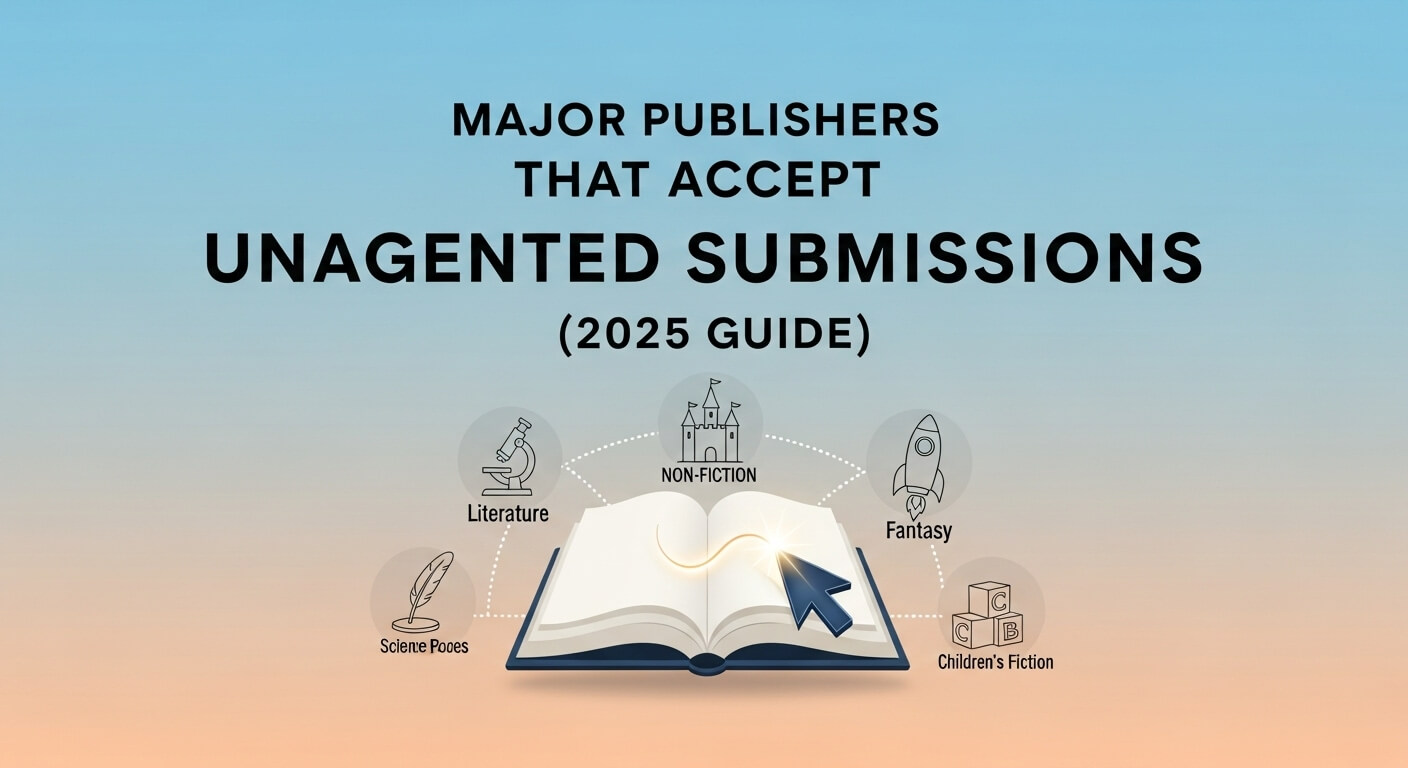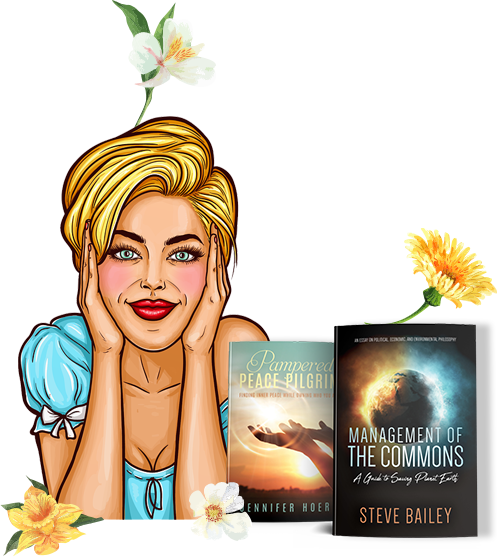Major Publishers That Accept Unagented Submissions (2025 Guide)
Publish Your Book View 50% off Pricing
Table of Contents
ToggleIntroduction
Breaking into traditional publishing is a dream for many writers, but the first roadblock often comes with a tough industry rule: “No unsolicited manuscripts without an agent.” For decades, the big five publishers (Penguin Random House, HarperCollins, Hachette, Macmillan, and Simon & Schuster) have favored agented submissions, making it difficult for new authors to get noticed.
But here’s the good news, some major publishers, select imprints, and respected independent presses do accept unagented submissions. If you’re an author without representation, you still have opportunities to land a traditional publishing deal.
In this guide, we’ll explore which major publishers accept unagented submissions in 2025, how to approach them, and strategies to maximize your chances of success.
Why Do Publishers Usually Require Agents?
Before diving into the list, it helps to understand why most publishers insist on agented submissions:
- Filtering & Quality Control – Agents act as gatekeepers, ensuring manuscripts meet industry standards.
- Time Management – Major publishers receive thousands of submissions. Agents help reduce slush pile overload.
- Negotiation Power – Publishers know agents are skilled negotiators, which creates fairer contracts for both sides.
That said, publishers are still eager to discover fresh voices. To do that, some maintain open submission periods or imprints specifically designed for unagented authors.
Do Major Publishers Ever Accept Unagented Submissions?
Yes — but with conditions. While most imprints under the Big Five are closed to direct submissions, some exceptions exist:
- Special Open Calls – Publishers sometimes announce limited-time submission windows.
- Genre-Specific Imprints – Romance, sci-fi, fantasy, and children’s books are often more open to direct submissions.
- Small-to-Mid-Sized Presses Owned by Majors – These often allow unagented authors to submit queries.
List of Major Publishers That Accept Unagented Submissions (2025)
Here’s a breakdown of publishers and imprints you should consider if you’re submitting without an agent:
1. Harlequin (HarperCollins) – Romance and Genre Fiction
- Harlequin is one of the largest publishers in the world, specializing in romance and women’s fiction.
- They regularly accept unagented submissions through their various imprints (Harlequin Presents, Love Inspired, etc.).
- Genres accepted: Romance, suspense, fantasy romance.
- How to submit: Upload manuscripts directly through the Harlequin Submittable portal.
2. DAW Books (Penguin Random House)
- A respected imprint for science fiction and fantasy.
- Accepts unsolicited full manuscripts from unagented authors.
- Known for discovering fresh voices in speculative fiction.
- How to submit: Manuscripts can be emailed per their guidelines.
3. Baen Books (Independent but Distributed by Simon & Schuster)
- A powerhouse in sci-fi and fantasy publishing.
- Accepts unagented submissions year-round.
- Very author-friendly contracts.
- How to submit: Manuscripts sent electronically via Baen’s submission system.
4. Tor/Forge (Macmillan) – Select Open Calls
- Tor, one of the biggest fantasy and science fiction publishers, occasionally opens to unagented submissions.
- In 2025, Tor Teen and Tor.com Publishing are expected to continue seasonal open calls.
- Genres accepted: YA fantasy, adult fantasy, horror, science fiction.
5. Kensington Publishing Corp. (Independent)
- Known as “America’s Independent Major Publisher.”
- Open to unagented submissions across multiple genres.
- Publishes romance, thrillers, cozy mysteries, and general fiction.
How to submit: Query via email with synopsis + first chapters.
6. Chronicle Books
- A San Francisco, based publisher with international distribution.
- Open to unsolicited submissions for illustrated books, children’s titles, and select nonfiction.
Genres accepted: Children’s books, lifestyle, humor, pop culture.
7. Bloomsbury Spark (Bloomsbury Publishing)
- A digital-first imprint of the well-known publisher behind Harry Potter.
- Accepts unagented submissions for YA fiction.
- Particularly friendly to debut authors.
8. Wattpad Books (Partnership with Macmillan/PRH)
- Originating from the Wattpad platform, now a traditional publishing arm.
- Open to writers who have built followings on Wattpad.
- Accepts unagented authors selected via Wattpad Stars and submission programs.
How to Submit to Publishers Without an Agent
1. Research Each Publisher Thoroughly
Every publisher has unique submission guidelines. Ignoring these is the fastest way to rejection.
2. Polish Your Manuscript
Major publishers expect professional-quality work. Hire an editor if possible (companies like Vox Ghostwriting offer developmental editing and manuscript polishing).
3. Write a Strong Query Letter
Your query should include:
- A hook (one-sentence pitch).
- A synopsis of the story.
- Your author bio and writing credentials.
4. Follow Submission Guidelines Exactly
Some want the full manuscript, others want only the first three chapters. Never cut corners.
5. Be Patient
Response times can range from 3 months to a year. Simultaneous submissions are usually allowed, but always check.
Pros and Cons of Submitting Without an Agent
✅ Pros
- Direct access to publishers.
- Faster submission process (no waiting for agent representation).
- Chance to build relationships with editors.
❌ Cons
- Harder to get noticed among thousands of submissions.
- You’ll need to negotiate contracts on your own (risky without legal expertise).
- Fewer opportunities with the biggest imprints.
Alternatives to Major Publishers
If you find the Big Five and mid-sized presses too competitive, consider:
- Small Presses – Many open to debut authors.
- Hybrid Publishing – A mix of self-publishing and traditional models.
- Self-Publishing – Complete control, faster publishing, higher royalties.
FAQs About Major Publishers & Unagented Submissions
❓ Do Big Five publishers ever accept unagented manuscripts?
Generally no, except through specific imprints or special open submission periods.
❓ Which genres have the best chance?
Romance, fantasy, sci-fi, and children’s books are the most common categories open to unagented authors.
❓ Should I hire an editor before submitting?
Yes — professional editing greatly improves your chances. Services from firms like Vox Ghostwriting help align manuscripts with publisher standards.
❓ Is self-publishing better than submitting without an agent?
It depends. Self-publishing gives control and royalties, but traditional publishing gives credibility and wider distribution.
Conclusion
Submitting to major publishers that accept unagented submissions is challenging but far from impossible. By targeting the right imprints, polishing your manuscript, and following submission guidelines to the letter, you can break into the traditional publishing world—even without an agent.
Whether you aim for Harlequin, DAW, Kensington, Baen, or Bloomsbury Spark, opportunities exist for talented writers who are persistent and professional.
If you want to increase your chances further, consider manuscript editing, ghostwriting support, and submission guidance from expert publishing services like Vox Ghostwriting.
Your publishing journey starts with a single submission — and in 2025, the doors are still open for unagented authors.





